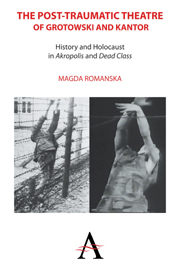 The Post-traumatic Theatre of Grotowski and Kantor
The Post-traumatic Theatre of Grotowski and Kantor from Part II - Our Memory: Kantor's Dead Class
Born in 1915 in Wielopole Skrzyńskie, a small Polish-Jewish town in Southern Poland, Tadeusz Kantor grew up in a world dominated by both Christian and Jewish mysticism. Today, in the house where Kantor was born, there is a small museum, with souvenirs from his childhood and props and drawings from his spectacles. During his childhood, every aspect of daily village existence, from birth to death, had religious ramifications that were imminently embedded within the entire sociocultural context of each congregation. The two worlds, Kantor remembers, “lived in an agreeable symbiosis,” each cultivating its own traditions. The synagogue and the church stood on opposite sides of the city; Jewish and Christian ceremonies were performed parallel to each other. Ruled by the cycles of their religious rituals, each community was oriented more towards sacred than earthly values. As Kantor reminisces, “beyond its everyday life, the little town was turned towards eternity.” The coexistence and intermingling of the two cultures, and the spiritually charged atmosphere of timelessness and mysticism they evoked, were resurrected time after time in all of Kantor's spectacles. The town – constructed like a theatrical space in which the predictable intertwined with the accidental, the grotesque with the profound, the sacred with the profane – became the framework for the juxtapositions Kantor investigated over years of theatrical experiments. Built around the everlasting oppositions between life and death, form and matter, illusion and reality, consciousness and object, Kantor's “religious dramas” attempt to simultaneously reconcile these poles and show the impossibility of doing so.
To save this book to your Kindle, first ensure [email protected] is added to your Approved Personal Document E-mail List under your Personal Document Settings on the Manage Your Content and Devices page of your Amazon account. Then enter the ‘name’ part of your Kindle email address below. Find out more about saving to your Kindle.
Note you can select to save to either the @free.kindle.com or @kindle.com variations. ‘@free.kindle.com’ emails are free but can only be saved to your device when it is connected to wi-fi. ‘@kindle.com’ emails can be delivered even when you are not connected to wi-fi, but note that service fees apply.
Find out more about the Kindle Personal Document Service.
To save content items to your account, please confirm that you agree to abide by our usage policies. If this is the first time you use this feature, you will be asked to authorise Cambridge Core to connect with your account. Find out more about saving content to Dropbox.
To save content items to your account, please confirm that you agree to abide by our usage policies. If this is the first time you use this feature, you will be asked to authorise Cambridge Core to connect with your account. Find out more about saving content to Google Drive.